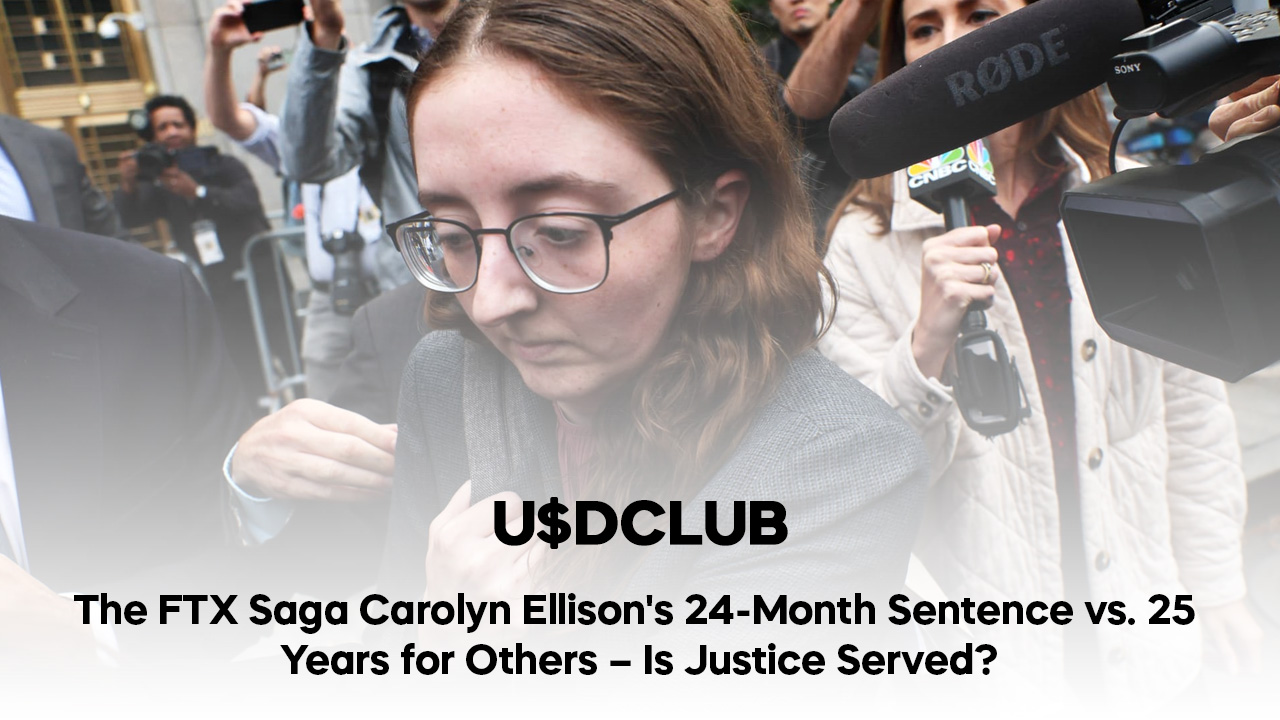The collapse of the cryptocurrency exchange *FTX* sent shockwaves through the financial world, becoming one of the most infamous financial frauds in U.S. history. The exchange, which had once been valued at a staggering $32 billion, unraveled in spectacular fashion, revealing a massive web of deceit, money laundering, and fraud. Among the central figures in this scandal was *Carolyn Ellison, who played a key role in the operations of FTX and its sister firm, **Alameda Research*.
While the mastermind behind FTX’s collapse, *Sam Bankman-Fried, was sentenced to 25 years in prison, Carolyn Ellison has been handed a comparatively lenient sentence of just **24 months*. Given the gravity of the crimes involved and the colossal losses suffered by investors, this disparity in sentencing has sparked a heated debate about justice and fairness. In this blog, we’ll explore the details of the FTX scandal, Ellison’s involvement, her cooperation with prosecutors, and whether her two-year sentence is appropriate for someone at the heart of one of the largest financial frauds in history.
The Rise and Fall of FTX
Before delving into the sentencing, it’s essential to understand how FTX rose to prominence and how it ultimately crumbled.
FTX was founded in *2019* by *Sam Bankman-Fried, and within a short span of two years, it grew into one of the world’s largest cryptocurrency exchanges, reaching a valuation of *$32 billion** by 2021. The platform attracted millions of users globally, offering them the ability to trade cryptocurrencies with ease. Backed by powerful investors and promoted by major celebrities, FTX quickly became a household name in the crypto community.
However, by *2022, cracks began to show. It was revealed that FTX had engaged in fraudulent activities, including using customer funds to cover losses at Alameda Research, a crypto trading firm closely linked to FTX. The company had effectively misappropriated *$8 billion** of customer funds, triggering a massive liquidity crisis that led to FTX filing for *bankruptcy* in November 2022. This marked the end of FTX and the beginning of one of the biggest financial scandals in history.
Carolyn Ellison’s Role: Mastermind or Pawn?
At the heart of this scandal was *Carolyn Ellison, a former romantic partner of Sam Bankman-Fried and the **CEO of Alameda Research*. Ellison played a crucial role in the day-to-day operations of Alameda and was directly involved in the fraudulent activities that led to FTX’s collapse.
Ellison has been accused of:
- Mismanagement of Funds: Under her leadership, Alameda Research misused billions of dollars in FTX customer funds. These funds were used to make high-risk bets and cover losses incurred by Alameda.
- Fraud and Money Laundering: Ellison, along with other FTX executives, was involved in fraudulent schemes designed to deceive investors, customers, and regulators. They laundered money through various channels to conceal the true financial health of FTX and Alameda.
- Deceptive Practices: FTX’s public-facing image was one of transparency and security. However, Ellison and other top executives knew that customer funds were being siphoned off to cover Alameda’s losses and finance their lavish lifestyles.
Despite her significant involvement in the fraud, Ellison cooperated with federal prosecutors, providing crucial evidence against Bankman-Fried and others involved in the scheme. This cooperation played a pivotal role in the case, leading to Bankman-Fried’s eventual conviction and 25-year prison sentence.
The Sentencing: Why Just 24 Months for Ellison?
Many have been left stunned by the apparent leniency shown to Carolyn Ellison in her sentencing. While she was initially facing a potential *110-year prison sentence, she has been sentenced to just **two years* behind bars. This drastic reduction in sentencing has raised several questions about the justice system’s handling of white-collar crimes, especially in cases as massive as the FTX fraud.
1. Cooperation with Prosecutors
One of the primary reasons for Ellison’s reduced sentence is her *cooperation* with the authorities. Prosecutors have emphasized that Ellison provided *valuable information* in over *20 meetings* that helped build the case against Sam Bankman-Fried and other top executives. Her testimony was crucial in exposing the inner workings of FTX and revealing the fraudulent activities that were taking place behind the scenes.
In exchange for her cooperation, Ellison was offered a more lenient sentence. This is a common practice in legal cases, especially when the testimony of a defendant is key to securing convictions against other criminals involved in the scheme. Prosecutors argued that without Ellison’s assistance, it would have been much harder to hold Bankman-Fried accountable.
2. Plea Agreement
Ellison accepted a *plea deal*, admitting to her involvement in fraud and money laundering. By doing so, she avoided a lengthy trial and the possibility of a much harsher sentence. The plea deal significantly reduced the charges against her, allowing her to serve just 24 months in prison.
3. First-Time Offender
As a *first-time offender*, Ellison may have been viewed more sympathetically by the court. Her lack of a prior criminal record could have influenced the judge’s decision to hand down a more lenient sentence, especially considering her cooperation with law enforcement.
Is 24 Months Fair for a Crime of This Magnitude?
The stark contrast between *Ellison’s 24-month sentence* and *Bankman-Fried’s 25-year prison term* has ignited debate about the fairness of her punishment. Given the scale of the FTX fraud and the *$8 billion* lost by investors, many believe that Ellison’s sentence is disproportionately light, especially when compared to other white-collar criminals who have received much harsher sentences for smaller offenses.
1. Disparity in Sentencing
The most glaring issue here is the disparity in sentencing between Ellison and her former partner, Sam Bankman-Fried. While Bankman-Fried was sentenced to 25 years for his role in the fraud, Ellison received just 2 years. Critics argue that Ellison was just as complicit as Bankman-Fried in orchestrating the fraud, and her lenient sentence undermines the severity of her crimes.
2. Impact on Victims
The collapse of FTX had a *devastating impact* on its customers and investors, many of whom lost their life savings. The *$8 billion* in stolen funds left countless people financially ruined. In this context, Ellison’s 24-month sentence seems insufficient to address the harm caused by the FTX collapse. For many victims, justice has not been fully served.
3. Perception of White-Collar Crime
Ellison’s light sentence also raises concerns about how the legal system treats *white-collar crime*. In cases involving financial fraud, it is often the case that those responsible for enormous losses face comparatively lenient punishments. This can create the perception that white-collar criminals, particularly those who cooperate with prosecutors, are not held accountable to the same degree as other types of criminals.
Lessons Learned from the FTX Scandal
The FTX scandal serves as a cautionary tale about the risks and vulnerabilities of the cryptocurrency industry. Despite the promise of *decentralization* and *financial independence*, the collapse of FTX highlights how easily fraud and mismanagement can occur when oversight is lacking.
Key lessons from this saga include:
– The Need for Regulation: The FTX collapse underscores the need for stricter regulation in the cryptocurrency industry. Without proper oversight, the potential for fraud and manipulation remains high.
– Transparency and Accountability: Companies in the cryptocurrency space must prioritize transparency and accountability to prevent similar scandals from occurring in the future. Investors and customers deserve to know how their funds are being managed and protected.
– Legal Consequences: The FTX scandal also raises important questions about the legal consequences of white-collar crime. While cooperation with prosecutors can lead to reduced sentences, it is essential that justice is seen to be done, particularly in cases involving billions of dollars in losses.
Conclusion: The Debate Over Justice
Carolyn Ellison’s *24-month sentence* has reignited the debate over the fairness of sentencing in white-collar crime cases. While her cooperation with prosecutors undoubtedly helped to secure convictions against Sam Bankman-Fried and other FTX executives, the leniency of her punishment raises questions about whether justice has truly been served.
For the millions of people affected by the FTX collapse, the fallout from this scandal will continue to be felt for years to come. As the cryptocurrency industry looks to recover from this dark chapter, the lessons learned from FTX’s rise and fall will shape the future of digital finance.
For more updates on the latest developments in the stock market and insightful investment strategies, stay tuned to *USDCLUB.us*, where we bring you timely news and analysis from the world of finance.







